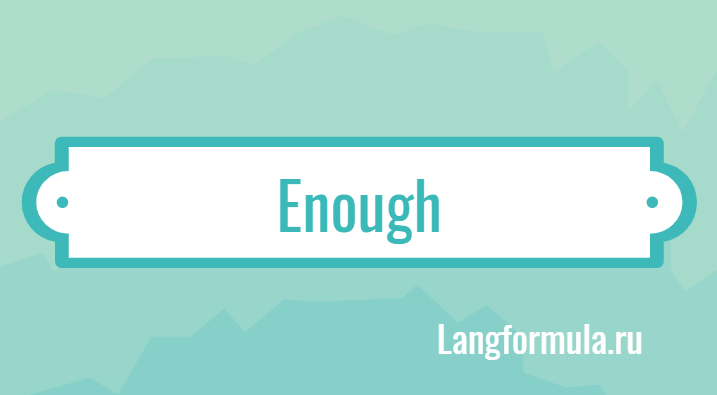Сегодня мы рассмотрим простенькое, казалось бы, слово enough — достаточно, которое вы наверняка знаете. С ним связана небольшая трудность: enough иногда стоит перед определяемым словом (enough time), а иногда после (hard enough).
В сочетании с существительным порядок слов такой: «enough + существительное». В данном случае, enough — это определитель существительного, как, например, many, much, little, some и др. Определители всегда стоят перед существительным.
You have enough time for reading. — У тебя достаточно времени для чтения.
I’m afraid, I don’t have enough money. — Боюсь, у меня недостаточно денег.
Enough после глагола, прилагательного или наречия
В сочетании с глаголом, enough выступает в роли наречия меры и степени и ставится после глагола.
Get some rest, you’ve worked enough. — Отдохни, ты достаточно поработал.
I think I’ve told you enough. — Я думаю, что достаточно вам рассказал.
Напомню, наречие в английском языке может определять не только глагол, но и прилагательные и другие наречия. Enough, как правило, располагается после прилагательных и наречий. В этом особенность слова enough, другие наречия идут перед прилагательным или наречием, сравните:
| Другие наречия | Enough |
|---|---|
| This drink is really cheap. — Этот напиток действительно дешевый. | This drink is cheap enough. — Этот напиток достаточно дешевый. |
| He is speaking too fast. — Он говорит слишком быстро. | He is speaking fast enough. — Он говорит достаточно быстро. |
| She is insanely talented! — Она безумно талантлива! | She is talented enough. — Она достаточно талантлива. |
- Правильно: He is smart enough. — Он достаточно умен.
- Неправильно: He is enough smart. — Он достаточно умен.
Другие примеры с прилагательными и наречиями:
Get some rest, you’ve worked well enough. — Отдохни, ты поработал достаточно хорошо.
Is this suitcase big enough? — Этот чемодан достаточно большой?
Enough + for/to — достаточно для чего-то
После enough часто идет пояснение для чего именно чего-то достаточно. Оно выражено двумя способами.
- Enough for something, someone
Добавляем for + лицо, предмет.
This envelope is big enough for my letter. — Этот конверт достаточно велик для моего письма.
This coffee is hot enough for me. — Этот кофе достаточно горяч для меня.
- Enough + to-verb (инфинитив с частицей to)
A bell is not enough to keep a bear away. — Колокольчика недостаточно, чтобы отпугнуть медведя.
Is it enough to be honest? — Достаточно ли быть честным?
На тему выражения цели рекомендую также этот урок из моего курса грамматики и статью про инфинитив.
Полезные выражения с Enough
- That’s enough! (Enough!) — Хватит!
Используется как «Хватит!», «Достаточно!» в русском языке. Обычно с целью жестко прервать чье-то недостойное поведение.
That’s enough, guys, let’s stop fooling around and get down to the business. — Хватит уже, ребята, давайте прекратим дурачиться и займемся делом.
- I’ve had enough (of something) — С меня хватит
С меня хватит, я сыт по горло, достаточно и т. д. С помощью of можно пояснить, чем именно вы сыты по горло.
I’ve had enough of your lies. — Хватит с меня твоей лжи.
I’ve had enough, turn off this stupid show. — С меня хватит, выключи эту глупую передачу.
- Fair enough — Согласен, справедливо
Говорят в знак согласия с чем-то, понимания, одобрения. Это довольно тонкий оборот, он может значить, что вы согласны с чем-то, но согласились с трудом, например, после дополнительного объяснения, а то и просто сделали вид, что согласились.
— Why don’t you like this movie? Isn’t it interesting? — Почему тебе не нравится этот фильм? Разве он не интересный?
— Well, I think it is but, you know, it’s just a bit too long. — Ну, я думаю, что интересный, но, знаешь, он просто как бы слишком длинный.
— Hm… Fair enough. — Хм, справедливо.
Впрочем, fair enough может значить и полное согласие — как всегда, все очень зависит от контекста, интонации, скажете ли вы это с ехидной улыбкой или нет.
- Enough is enough — Хватит! / Я сказал, хватит
Используется, когда нужно что-то резко прекратить. Вроде как ударить кулаком по столу, но словесно. По сути это синоним «That’s enough!»
Enough is enough! I don’t want to argue with you any more. — Хватит! Я не хочу с тобой больше спорить.
Здравствуйте! Меня зовут Сергей Ним, я автор этого сайта, а также книг, курсов, видеоуроков по английскому языку.
Подпишитесь на мой Телеграм-канал, чтобы узнавать о новых видео, материалах по английскому языку.
У меня также есть канал на YouTube, где я регулярно публикую свои видео.
Updated on March 06, 2019
Too and enough can modify both nouns, adjectives, and adverbs. Too indicates that there is too much of a quality, or too much or too many of some object. Enough means that there is no need for more of a quality or object. Here are some examples:
- She’s too sad these days. I wonder what’s wrong.
- I don’t have enough sugar. Let’s go to the supermarket.
- You’re driving too slowly!
- There are too many students in this class. It should be smaller.
- This test is difficult enough already!
- We have too much pollution in the world.
Focus on Enough
Reading the examples, you may notice that enough is sometimes placed before the word it modifies. For example:
- What do we need for dinner? I think we have enough vegetables, don’t we?
- She feels that Tom has more than enough time to help.
In other examples, enough is placed after the word it modifies. For example:
- You should ask John for help. He’s rich enough to help us all!
- I don’t think they are smart enough to take that class.
Take a look at the words modified in the examples above. You will note that ‘enough’ is placed in front of the nouns ‘vegetables’ and ‘time.’ Enough is placed after the adjectives ‘rich’ and ‘smart.’
Rules for Enough
Adjective + Enough
Place enough directly after the adjective modified when using enough as an adverb to mean to the required degree or extent.
- He’s not patient enough to understand children.
- My friend wasn’t intelligent enough to take the job.
Adverb + Enough
Place enough directly after the adverb modified when using enough as an adverb to mean to the required degree or extent.
- Peter drove slowly enough for us to look at all the houses.
- The students studied carefully enough to do well on the exam.
Enough + Noun
Place enough directly before a noun to state that there is as much or as many as required.
- Do you have enough money for your vacation?
- I’m afraid we don’t have enough oranges to make the dessert.
Focus on Too
Reading the examples, you can notice that ‘too’ is used with nouns, adjectives, and adverbs. However, when using too with nouns, too is followed by ‘much’ or ‘many.’ The choice of too much or too many depends on whether the noun modified is countable or uncountable, also referred to as count and non-count nouns.
- Anna is too concerned about her grades.
- The boys are too crazy today!
- We have too many books in this room.
- There is too much information to learn these days.
Rules for Too
Too + Adjective
Place too before adjectives to state that something has an excess amount of quality.
- He’s too angry about that incident.
- Mary is too anxious about her cousin.
Too + Adverb
Place too before adverbs to state that someone is doing something to an excess or more than necessary.
- That man is driving too slowly. I wonder if he’s been drinking.
- You are speaking too rudely to that man. It’s important to be kind!
Too Much + Uncountable Noun
Place too much before uncountable nouns to state that there is an excess amount of an object.
- We have too much time on our hands this weekend.
- You’ve put too much sugar in the cake.
Too Many + Countable Noun
Place too many before plurals of countable nouns to state that there is an excess number of an object.
- Franca has too many problems to deal with this week.
- The boys have bought too many clothes. Let’s take some of them back to the store.
Too / Enough Quiz
Rewrite the sentence adding too or enough to the sentence to modify an adjective, adverb or noun.
- My friend isn’t patient with his friends.
- I don’t have time to get everything done.
- I think the test was difficult.
- There is much salt in this soup!
- You are walking slowly. We need to hurry up.
- I’m afraid I have many responsibilities.
- Peter isn’t working fast. We’ll never finish on time!
- I wish I were intelligent to pass this test.
- Is there wine for dinner?
- He types quickly, so he makes a lot of mistakes.
Answers
- My friend isn’t patient enough with his friends.
- I don’t have enough time to get everything done.
- I think the test was too difficult.
- There is too much salt in this soup!
- You are walking too slowly. We need to hurry up.
- I’m afraid I have too many responsibilities.
- Peter isn’t working fast enough. We’ll never finish on time!
- I wish I were intelligent enough to pass this test.
- Is there enough wine for dinner?
- He types too quickly, so he makes a lot of mistakes.
В сегодняшней теме мы рассмотрим употребление наречия enough в английском языке, изучим образование предложений с ним и примеры использования.

Рассмотрим пример:
I’m not going to take a taxi. I don’t have enough money. (Я не еду на такси. У меня недостаточно денег)
Enough — это наречие меры. Мы используем его в значении «достаточно».
Enough употребляется с существительными в следующей конструкции.
Примеры
- There weren’t enough chairs for everyone. (Для всех было недостаточно стульев);
- We were in New York for only two days. We didn’t have enough time to see the things we wanted. (Мы были в Нью-Йорке всего два дня. У нас не было достаточно времени, чтобы посмотреть то, что мы хотели);
- You can stay in my apartment. There is enough space for both of us. (Ты можешь остаться у меня. Для нас обоих достаточно места).
Мы можем употреблять enough без существительного.
- How much money do you have? I have enough. (Сколько у тебя денег? У меня достаточно);
- Would you like more tea? Thanks, I’ve had enough. (Хотите ещё чая? Спасибо, мне достаточно);
- You work too much. You don’t rest enough. (Ты слишком много работаешь. Ты не достаточно отдыхаешь).
Употребление enough с прилагательными

Рассмотрим пример:
He can’t bench press 100 pound. He’s not strong enough. (Он не может выжать от груди 100 фунтов. Он не достаточно силен).
Обратите внимание на конструкцию enough с прилагательными.
Примеры
- Can you reach that book over there? No. Ask Jim. He’s tall enough. (Можешь достать ту книгу? Нет. Попроси Джима. Он достаточно высок);
- There are so many people. Our car is not big enough. (Так много людей. Наша машина недостаточно большая);
- Can you hear the TV? Is it loud enough for you? (Тебе слышно телевизор? Тебе достаточно громко?).
Подведём небольшой итог:
Enough ставится перед существительными.
- I don’t have enough money.
Enough ставится после прилагательных.
- I’m not tall enough. (Я не достаточно высокий)
Enough for, enough to do
Наречие enough может употребляться в следующих конструкциях:
- Enough for… — достаточно для кого-то или чего-то;
- Enough to + do — достаточно, чтобы сделать что-то;
- Enough for… to do.. — достаточно для кого-то, чтобы сделать что-то.
Примеры
- We don’t have enough money for a new car. (У нас недостаточно денег на новую машину?)
- Is this knife sharp enough to cut the meat ? (Нож достаточно острый, чтобы порезать мясо?);
- He doesn’t have enough money to buy a car. (У него недостаточно денег, чтобы купить машину);
- Are you tall enough to reach the top shelf? (Ты достаточно высокий, чтобы дотянуться до верхней полки?);
- There is not enough chairs for everybody to sit. (Для всех недостаточно стульев, чтобы сесть);
- I don’t think that job is good enough for you to apply. (Не думаю, что эта работа достаточно хороша для тебя, чтобы на неё претендовать).
Употребление enough в английском языке — тест на закрепление
enough
after adjectives and adverbs
You use enough after an adjective or adverb to say that someone or something has as much of a quality as is needed.
We have a
long enough
list.
The student isn’t trying
hard enough
.
If you want to say who the person or thing is acceptable to, you add a prepositional phrase beginning with for.
That’s
good enough for me
.
Is the soup hot enough for you?
If someone has as much of a quality as they need in order to do something, you add a to-infinitive after enough.
The children are
old enough to travel to school on their own
.
You can also use a to-infinitive after enough to say that something has as much of a quality as is needed for someone to do something with it. If you want to make it clear who you are talking about, you can add a prepositional phrase beginning with for. For example, you can say ‘The boat was close enough to touch’ or ‘The boat was close enough for me to touch it’.
The bananas are
ripe enough to eat
.
The music was just loud enough for us to hear it.
*
Be careful
Don’t use a that-clause after enough when you are saying what is needed for something to be possible. Don’t say, for example, ‘The bananas are ripe enough that we can eat them’.
Enough is sometimes used after an adjective to confirm or emphasize that something or someone has a particular quality.
It’s a
common enough
dilemma.
When you make a statement of this kind, you often add a second statement that contrasts with it.
She’s likeable enough, but very ordinary.
used as a determiner
Enough is used in front of the plural form of a countable noun to say that there are as many things or people as are needed.
They need to make sure there are
enough bedrooms
for the family.
Do we have
enough chairs
?
You can also use enough in front of an uncountable noun to say that there is as much of something as is needed.
We had
enough room
to store all the information.
He hasn’t had enough exercise.
‘enough of’
Don’t use enough immediately in front of a noun phrase beginning with a determiner, or in front of a pronoun. Instead you use enough of.
All parents worry about whether their child is getting
enough of the right foods
.
They haven’t had enough of it.
When you use enough of in front of a plural noun or pronoun, you use a plural form of a verb with it.
Eventually enough of these shapes
were
collected.
There
were
enough of them to fill a large box.
When you use enough of in front of a singular or uncountable noun or a singular pronoun, you use a singular form of a verb with it.
there enough of a market for this product?
There is enough of it for everybody.
used as a pronoun
Enough can be used on its own as a pronoun.
I’ve got
enough
to worry about.
has been said about this already.
‘not enough’
Don’t use enough, or enough and a noun, as the subject of a negative sentence. Don’t say, for example, ‘Enough people didn’t come‘. You say ‘Not enough people came’.
has been done to help them.
Not enough attention is paid to young people.
modifying adverbs
You can use adverbs such as nearly, almost, just, hardly, and quite in front of enough.
At present there is
just enough
to feed them.
There was hardly enough time to have lunch.
You can also use these adverbs in front of an expression consisting of an adjective and enough.
We are all
nearly young enough
to be mistaken for students.
She is
just old enough
to work.
used with sentence adverbials
You can use enough after sentence adverbials like interestingly or strangely to draw attention to a surprising quality in what you are saying.
, there were some questions that Brian couldn’t answer.
I find myself strangely enough in agreement with Jamal for a change.
‘enough‘ also found in these entries (note: many are not synonyms or translations):
Hi there! В нашей сегодняшней статье поговорим о наречиях «too» и «enough». Вы узнаете: какие у них значения, как употреблять в контексте, с какими частями речи использовать, чем они отличаются и чем похожи.
Бывают такие дни, когда обычного прилагательного и существительного недостаточно, а «really» и «very» уже надоели, и мы чувствуем, что нам чего-то не хватает для грамматического счастья.
Мы знаем чего — «too» (слишком) и «enough» (достаточно). Эти наречия можно употреблять с прилагательными, другими наречиями, а «enough» даже с существительными. Но где и когда их ставить? Давайте разберемся какая разница между too и enough!
Содержание статьи:
- Too
- Enough
- Чем отличаются too и enough?
- Упражнение для закрепления
- Заключение
Too
Произношение и перевод: [tu:] / слишком.
Значение слова: выше, чем допустимо или возможно.
Употребление: используется в предложениях, когда нужно сказать, что чего-то больше, чем нужно.
She has too much work to do, she’ll be busy this weekend.
У нее слишком много работы, она будет занята на этих выходных.
Наречие «too» используем с прилагательными и другими наречиями, включая последние меры и степени (many / much / little). В предложении оно ставится перед словом, с которым работает в паре.
You drink too much coffee. – Ты пьешь слишком много кофе.
He’s too lazy to work. – Он слишком ленив, чтобы работать.
This car is too expensive. – Эта машина слишком дорогая.
She drives too fast. – Она ездит слишком быстро.
He talks too slow. – Он говорит слишком медленно.
Советуем к прочтению: В чем разница между Many, Much и A lot?
«Too» часто используется в конструкции:
- Too + Adjective/Adverb + To/For
Предлог «to» добавит обстоятельство цели, а «for» — существительное или местоимение.
He is too stupid for this task. – Он слишком глуп для этого задания.
I am too tired to work today. – Я слишком устал, чтобы работать сегодня.
Важно! Не перепутайте наречие too, которое «слишком» (перед наречием и прилагательным) с тем, которое «тоже» (в конце предложения).
I like to watch horror movies too. – Я тоже люблю смотреть фильмы ужасов.
I watch too many horror movies. – Я смотрю слишком много фильмов ужасов.
Советуем к прочтению: В чем разница между Too, So и Very?
Читай также
Как совместить английскую грамматику с практикой речи
Enough
Произношение и перевод: [ɪ’nʌf] / достаточно.
Значение слова: в той степени, в которой необходимо.
Употребление: используем, чтобы показать необходимую норму чего-то.
I have enough money to buy this dress. – У меня достаточно денег, чтобы купить это платье.
Наречие «enough» употребляется не только с прилагательными и другими наречиями, но и с существительными.
- «Enough» ставится после прилагательных (какой?) и наречий (как?)
That sounds simple enough. – Это звучит достаточно просто.
This room is large enough. – Эта комната достаточно большая.
Try this jacket on and see if it’s good enough for you. – Примерь эту куртку и посмотри, достаточно ли она тебе подходит.
You won’t pass the exam unless you work hard enough. – Вы не сдадите экзамен, если не будете достаточно усердно работать.
- «Enough» ставится перед существительными.
I have enough money to buy this book. – У меня достаточно денег, чтобы купить эту книгу.
Также, можно использовать «enough» с частицей «not» в значении «не достаточно». Если «enough» стоит после слова, то «not» ставим перед словом, к которому оно относится.
There is not enough water. – Не достаточно воды.
This knife is not sharp enough. – Этот нож не достаточно острый.
Так же, как и «too», «enough» можно употребить в конструкциях:
- Enough + Noun + To/ For
- Adjective/Adverb + Enough + To/For
Music was loud enough for us. – Музыка была достаточно громкой для нас.
There were enough seats for all guests. – Там было достаточно мест для всех гостей.
He wasn’t experienced enough to do that job. – У него не было достаточно опыта, чтобы выполнить ту работу.
Чем отличаются too и enough?
«Too» и «enough» выполняют одинаковую роль в предложении (указывают на меру, усиливая значение слова, употребляемого с ними в паре), однако по значению они разные. Более того, «enough» можно употреблять с существительными.
Порядок слов в предложении будет следовать одному из вариантов:
- Too + прилагательное/наречие.
- Прилагательное/ наречие + enough.
- Enough + существительное (предмет или лицо).
Рассмотрим примеры предложений с «too» и «enough» в таблице:
|
предложение |
перевод |
|
This sweater is too big for me. |
Этот свитер слишком большой для меня. |
|
I have waited long enough. |
Я ждал достаточно долго. |
|
There are not enough students in the class. |
В классе недостаточно студентов. |
|
They don’t study hard enough. |
Они не учатся достаточно усердно. |
Упражнение для закрепления
Потренируемся? Ответы на это упражнение находятся сразу под картинкой. So watch out!
1. Он бегает слишком быстро.
2. Ты говоришь слишком громко.
3. То блюдо было слишком острым.
4. Слишком тепло для этого времени года.
5. Там не было достаточно чашек для всех.
6. Я слишком расстроен, чтобы обсуждать это сейчас.
7. Эти новости слишком хорошие, чтобы быть правдой.
8. Ты достаточно взрослый, чтобы сделать это самостоятельно.
9. Шкаф достаточно большой, чтобы хранить в нем все мои вещи.
10. Я бы хотел путешествовать, но у меня нет достаточной суммы денег для этого.
Ответы:
- He runs too fast.
- You’re talking too loud.
- That dish was too spicy.
- It’s too warm for this time of the year.
- There weren’t enough cups for everyone.
- I’m too upset to discuss it now.
- The news is too good to be true.
- You are old enough to do it yourself.
- The wardrobe is big enough to keep all of my stuff.
- I’d like to travel, but I don’t have enough money for that.
Пишите в комментариях сколько правильных ответов вы сделали!
Читай также
Учебники и пособия для подготовки к международным экзаменам по английскому
Заключение
Надеемся, что статья помогла вам понять, как употреблять «too» и «enough», и разница вам ясна. Давайте подытожим самое важное:
- «Too» — слишком (ставим перед прилагательными или наречиями).
- «Enough» — достаточно (ставим перед существительными, после прилагательных и наречий).
Английской грамматики слишком много не бывает. So, don’t forget to feed yourself with it every day!
Большая и дружная семья EnglishDom






